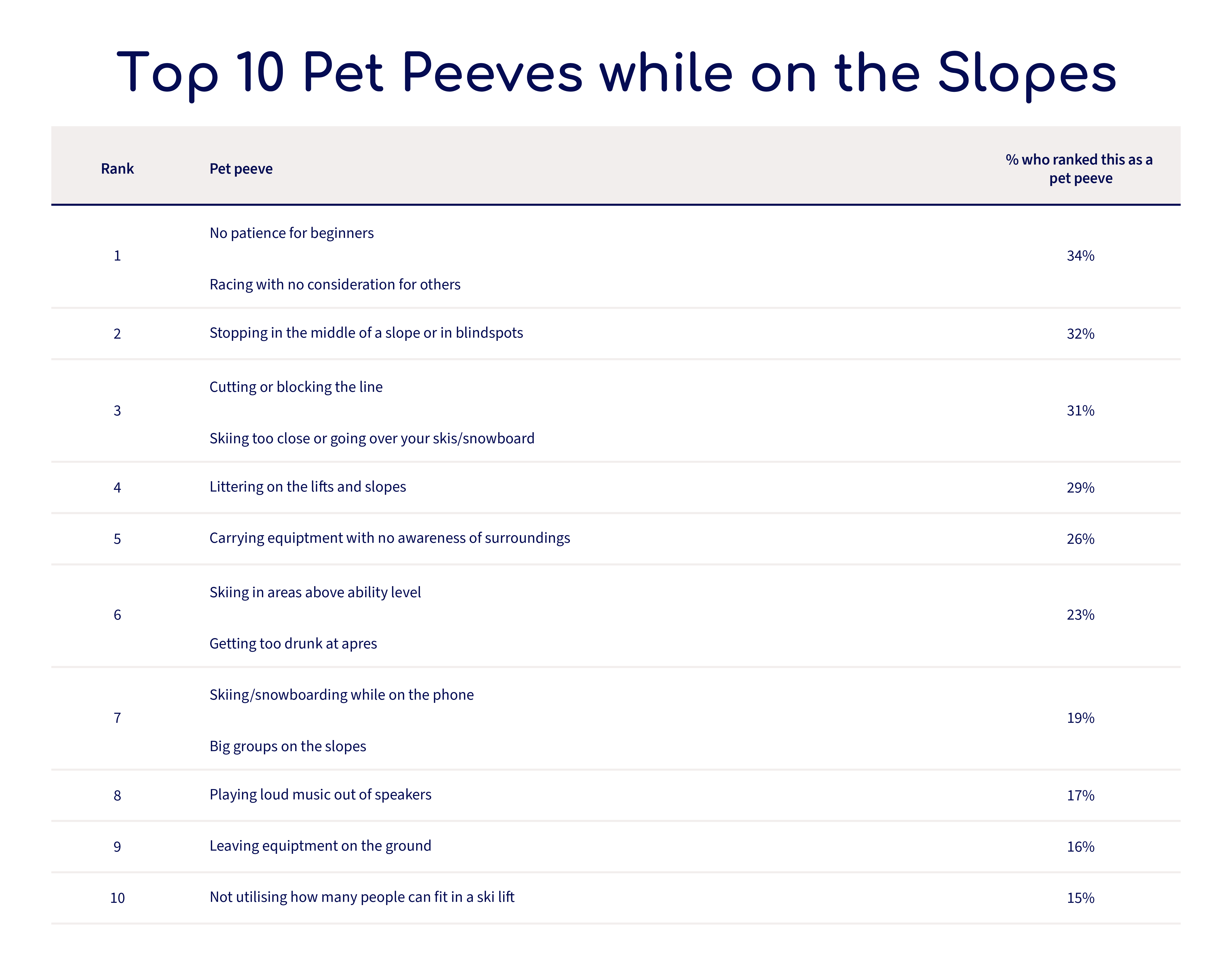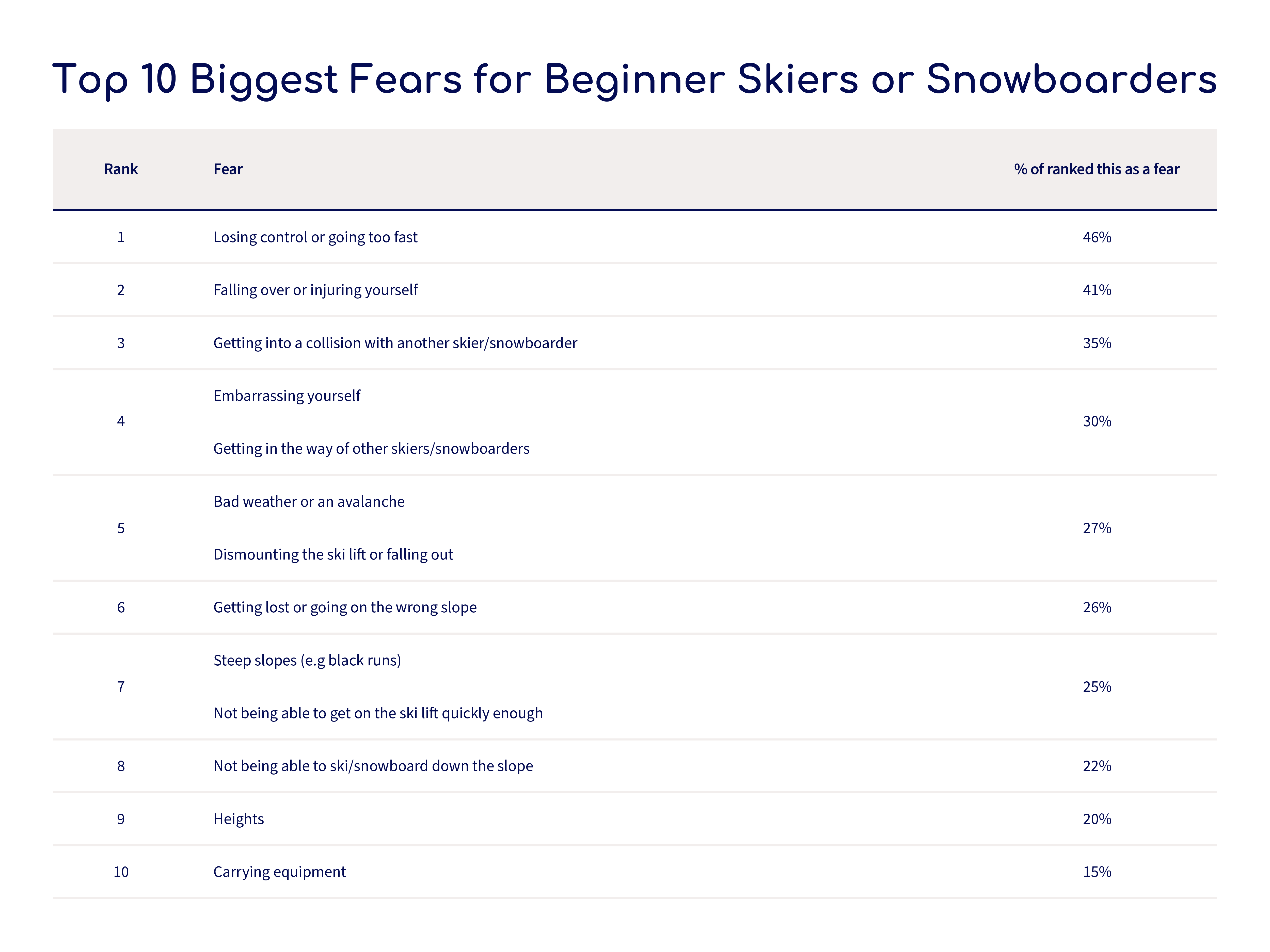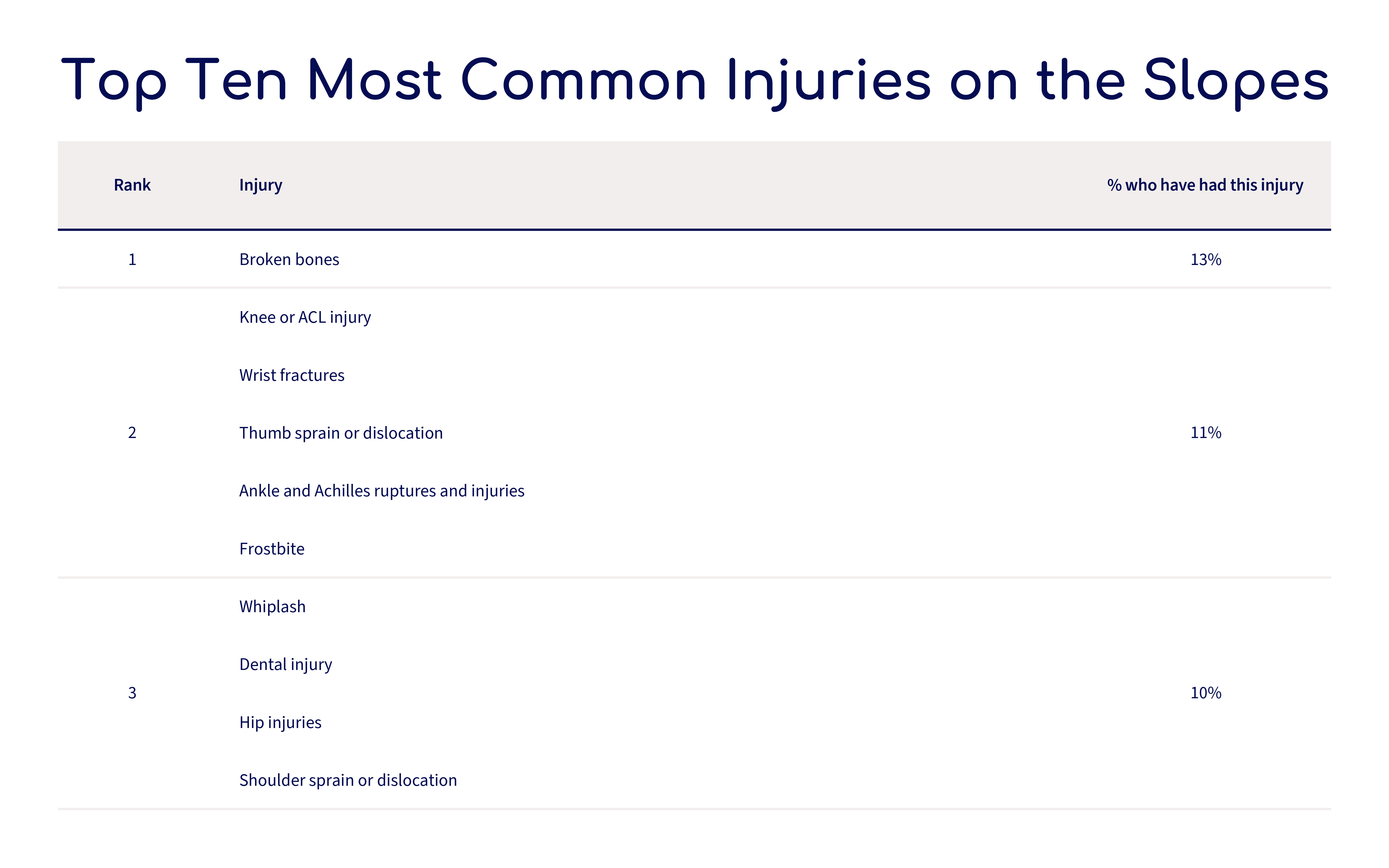
According to our latest research, half (50%) of surveyed winter sports fans in the UK plan to go on a snow sports holiday this year. So we spoke to over 1,000 skiers and snowboarders from across the UK to help you prepare for your next trip.
Our research reveals the biggest pet peeves people experience when on the slopes, as well as the main fears for beginners and the most common mountain-side injuries. The survey explores the different opinions between skiers and snowboarders, and experience levels. These insights could help those heading on a snow sports trip prepare for how to act safely and respectfully on the mountain.
We also interviewed Michael Weeks, a former ski instructor of over 25 years. He’s shared his top tips for avoiding some of the most common mistakes to make on your ski or snowboard trip, from skimping on lessons to forgetting to take out winter sports holiday insurance.
Top 10 pet peeves while on the slopes
Whether you’re a beginner or a seasoned pro, understanding proper snow sports etiquette is important. As well as being polite to fellow skiers or snowboarders, this will help keep you (and others) safe on the slopes.
To help Brits understand the main dos and don’ts for any snow sports trip, we asked respondents of all experiences to share their biggest pet peeves when on the mountain. They could select up to five pet peeves each.

Just over a third (34%) of people report being bothered by skiers and snowboarders who have no patience for beginners, making this one of the top pet peeves for Brits.
Beginners are more likely to make mistakes such as stopping in the middle of a slope, which can be frustrating for more advanced skiers or snowboarders who have to avoid them. However, it’s important to remember that we’re all beginners at some point, and a little patience goes a long way.
The other number one pet peeve for Brits is people racing with no thought for others, or speeding through beginner areas (34%). This once again points to being considerate of others on the slopes.
Biggest pet peeves by experience level
We looked into these results further to find out what the biggest pet peeves are for skiers and snowboarders across all abilities.

As expected, beginners are most bothered by people having no patience for those with less experience (40%). Mountains have their own set of unspoken rules. Without experience, it’s easier to break them. By being prepared before your trip, you could avoid these rookie mistakes and have a more enjoyable experience on the slopes.
For intermediate skiers or snowboarders, who are a bit more confident on the slopes, the biggest frustrations are people cutting or blocking the line (36%). They also don’t like it when people race with no consideration or patience for others, or through beginners' areas (34%).
More advanced skiers and snowboarders are most frustrated with people stopping in the middle of the slopes or in blindspots (34%). This is likely due to people coming down the mountain at a faster rate, compared to those that are less experienced. It seems that more advanced snow sport lovers have safety in mind when stating this is their biggest pet peeve on the mountain.
Skier vs snowboarder pet peeves

For skiers, their biggest grievance is once again people not being patient with beginners (36%). They’re also bothered by people racing with no consideration for others (35%), and people cutting or blocking the line (34%).
Meanwhile, snowboarders are more annoyed by people stopping in the middle of a slope or in blindspots (34%).
Top 10 biggest fears for beginner skiers or snowboarders
For beginner skiers or snowboarders, it’s natural to feel scared or nervous on the slopes.
To explore common anxieties for less experienced skiers and snowboarders, we asked respondents to select up to five of the biggest fears they faced when they were a beginner.

The top three biggest worries for beginner skiers and boarders is the thought of having an accident. Nearly half (46%) are worried about going too fast or losing control; two-fifths (41%) are worried about falling over or injuring themselves; and 35% fear getting into a collision with another skier or snowboarder.
These fears are shared by both skiers and snowboarders. This shows a common desire to avoid getting hurt or losing control.
One reason these fears are so common among beginners is not knowing much about the sport and the environment. Some beginners might not have the necessary skills or confidence to safely navigate the slopes. The reputation of skiing and snowboarding as extreme sports also adds to these fears, as people may worry about their ability to handle the adrenaline-fueled experience.
To ease these fears, it's important for beginners to prioritise safety and take precautions. Expert skiers and snowboarders better understand the importance of safety on the slopes. This is probably why their main pet peeves all revolve around dangerous behaviours that can lead to accidents.
Beginners, however, may need extra help understanding how to behave on the slopes. Proper instruction from certified instructors can build confidence. Starting on gentle slopes, then progressing to more challenging terrain can also help beginners get used to the sport while reducing the risk of accidents.
Taking out snow sports travel insurance can also offer peace of mind. The right insurance can cover you for things like accidents and injuries, so you can enjoy your holiday without worrying about unexpected costs.
Top five most common injuries on the slopes
Understanding the most common pet peeves and fears we face on the mountain can help us all be more mindful when going on a snow sports holiday. This could help avoid accidents or injuries on the slopes.
But sometimes people make mistakes. In fact, 61% of people we surveyed admit they’ve had an injury on a winter sports holiday. A third (32%) even said they’ve had to cut a ski trip short due to injury.
With this in mind, we’ve taken a look at some of the most common injuries that happen while on a ski or snowboard trip. We asked people if they had experienced any of the injuries highlighted in our analysis, so we can see which are the most likely to happen while on the slopes.

The most common injury is broken bones, with nearly one in six of Brits surveyed (13%) having experienced this on a snow sports holiday. Maybe unsurprisingly, this is the most common type of injury for both skiers and snowboarders of all levels.
Broken bones are followed by knee or ACL injuries, wrist fractures, thumb sprains or dislocation, ankle and achilles ruptures, and frostbite. Just over one in 10 people (11%) report experiencing each of these injuries on the mountain.
Of the people who have faced an unexpected injury like this while on holiday, we found that a third (32%) have had to pay out for medical care because they didn’t have insurance.
It’s important to make sure you’re protected in the event of an accident. Winter sports travel insurance can cover you for things like medical emergencies, getting you home safely, and the cost of having to cut a holiday short because of an injury. Not all travel policies will cover winter sports as standard, so when you take out travel cover, make sure you have winter sports added to your policy.
One in five Brits didn’t take lessons before going skiing for the first time
According to our survey, as many as one in five people (18%) didn’t take lessons before going skiing for the first time.
Without any experience, beginners are left to navigate the slopes without understanding proper techniques and safety. This can add to the risk of accidents and injuries. Beginners may struggle to control their speed, make turns effectively, or react appropriately in crowded or challenging terrain. Taking some lessons before your trip is a good way to feel more confident and could reduce the risk of getting hurt.
On top of that, little experience could mean beginners don’t understand how to behave appropriately on the mountain. They may not understand proper ski etiquette without guidance. This could lead to them acting in ways that bother other skiers or snowboarders (such as stopping in the middle of slopes).
Skiing and snowboarding are often considered extreme sports, so it’s important to take the time to prepare properly before trying them. Some knowledge and experience ahead of your trip could make your trip more enjoyable and help you feel more confident on the slopes.
Five things to avoid when preparing for your snow sports holiday
It’s important to make sure you’re doing your research ahead of time to fully make the most of your trip (and your investment).
To help you prepare for your upcoming winter sports holiday, we’ve interviewed Michael Weeks, a former ski instructor with over 25 years of experience. He’s explored some of the most common mistakes beginners tend to make on their first ski or snowboard trip, and how to avoid these.
1. Not getting lessons
While 82% of people are preparing with lessons, 18% are still heading to the slopes with no experience. Not only are lessons important for your safety, but they’ll help you have more fun on your trip. Lessons are not just reserved for beginners, and are in fact a great way to refresh your memory and build confidence when on the slopes.
Michael explains, “You should always try and get some lessons in before hitting the slopes, whether this is on dry slopes or artificially-made snow.
“It’s good to get some time on skis, even if it’s just focused on the absolute basics of using your equipment, setting up, and moving around freely. Practising before your trip gets you ahead of the game, even if you’re planning to have lessons on the holiday too.”
2. Not choosing the right resort
The ski resort you choose can impact how much fun you get out of your holiday.
Michael suggests, “Make sure to do your research and look into the resort you want to book to make sure it’s right for you, both on and off the slopes.
“If you’re a complete beginner, you don’t want a tough resort with fewer green and blue runs. But if you’re a seasoned pro, you might want to go somewhere with great off-piste, and could be disappointed to turn up somewhere and find the terrain isn’t to your liking.”
To find the best resort to suit your level, check out our index of the world’s best ski resorts.
It’s also worth noting that many winter sports insurance policies don’t cover off-piste slopes. So if you are planning on skiing or snowboarding off-piste, remember to check if you’re covered.
3. Stopping in the wrong places on the slopes
One-third (32%) of those surveyed overall said that people stopping in the middle of a slope or in a blind spot is their worst pet peeve when on a snow sports holiday.
Michael says, “Whether you’re stopping in the middle of a busy area, on a tight or steep track, or below the crest of a hill, stopping in the wrong places can be really dangerous when on the mountain.
“Always try to stop at the sides of a piste, and off the track if possible, and certainly before the brow of an incline or hill so you’re visible.”
4. Buying the wrong equipment for level of experience
Choosing the right ski and snowboarding equipment isn’t a ‘one size fits all’ situation. There’s different gear depending on the type of skier or snowboarder you are, as well as how experienced you might be.
Those looking to hit the ramps or jumps at the park might prefer a freestyle ski or board. But those sticking to the groomed runs will need more traditional on-piste equipment.
On how to make sure you’re choosing the correct gear, Michael says, “Take advice from the experts in rental shops, and instructors in the resort. They know what they’re talking about and will cater your equipment to what you need. Not only will this keep you safe, but it’ll also make your skiing or snowboarding much more enjoyable.”
5. Not taking out specialised snow sports insurance
According to our survey, 33% of Brits never take out winter sports insurance when going on a snow sports holiday — despite 61% of people admitting they’ve had an injury on a snow sports holiday before. On the reasons why, 36% of people said it was because they didn’t feel it was necessary, while others said they forgot (35%) or they were trying to save money (33%).
Darren Saunders, Managing Director at PayingTooMuch says, “You never know what is going to happen on the mountain, so it’s important to take out specific winter sports travel insurance.
“According to our research, the top reasons for claiming on snow sports policies include: accidents or medical emergencies (36%), loss of personal or hired equipment (35%), and piste or mountain closures (32%), so choosing a policy that covers all of these scenarios is key.
“Our survey also found that 12% of people admit to not reading the terms and conditions of their policy before taking one out. It might not be the most interesting read, but different providers offer different levels of cover, so you need to make sure you’re protected for the important stuff.”
Sources and Methodology
All data was taken from a survey of 1,002 people in the UK who have previously been on a snow sports holiday. The survey was conducted in December 2023. Included in the survey are splits in respondents under the following categories: Age, gender, region, city, experience level, snow sport type, number of times they have been on a ski holiday, and the last time they have been on a ski holiday.

